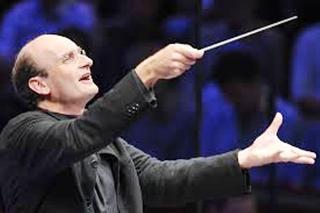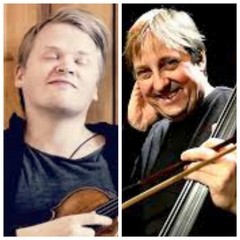|
Back
Smiles (Okay, Laughter) of a Summer Night New York
David Geffen Auditorium, Lincoln Center
07/26/2019 - & July 27*, 2019
Béla Bartók: Rumanian Folk Dances, BB 76 (arr. Arthur Willner)
Antonio Vivaldi: Le quattro stagioni, Opus 8 No. 1-4, interspersed with folk music from Norway, Finland and Hungary
Pekka Kuusisto (Violin), Knut Erik Sundquist (Bass)
Mostly Mozart Festival Orchestra, Andrew Manze (Conductor)

A. Manze
“Springtime is upon us. The birds celebrate their return with festive song. Murmuring streams are softly caressed by the breezes. Yet there are no words. Only music.”
Antonio Vivaldi (1678-1741)
When Iván Fischer presented Rumanian Folk Dances repeated with the original songs performed by Márta Sebestyén three months ago, the sounds of Béla Bartók were changed forever in this person’s mind. The Art, the Nature, the Original creation were blended into one glorious entirety, where Central European music leaped from the notes to the soul.
Andrew Manze is a fabulous conductor, but not even he, with the Mostly Mozart Festival Orchestra, could not have surpassed Mr. Fischer’s singular genius.
On the other hand (or in this case, the other hands since Mr. Manze did away with his baton), Vivaldi’s Four Seasons had such an atypical rendition that again, the sounds will be indelible.
Of course we know that Four Seasons is hardly set in stone, though the original poetry and music is so picturesque. Yet many composer try their wits. Astor Piazzolla’s Four Seasons of Buenos Aires had been played last night before the 7.30 pm show, and it is a delightful work. Max Richter’s updated Seasons is more than clever (though after two hearings, one inevitably goes back to Vivaldi). Rock, jazz and pop have all taken up the Vivaldi, and one Canadian group arranged it for Chinese pipa, Indian sarangi and Inuit throat-singing.
Mr. Manze didn’t go that far. In fact, the interpolation of fiddle-and-bass Norwegian, Finnish and Hungarian folk songs in between the movements was clever, but hardly the determinate of genius in the performance last night.
Vivaldi’s pictures were those of the earth–but three stars shone for this concert. Andrew Manze conducted both work as if he was inventing each note as it came along. He laughed, smiled, egged on the Mostly Mozart Festival Orchestra. (Though these days, Lincoln Center’s summer ensemble should be called “Sometimes Mozart Festival Orchestra”).
Of course the auditorium (and stage) was packed for the Vivaldi (though perhaps many of the seats were occupied by the Association of Chronic Fortissimo Coughers). Us experienced listeners were not anticipating yet another “Seasons” with great joy. But Mr. Manze made it especially festive.
His was not conventional conducting: rather, it was playing to the Unwashed Masses. Exaggerated motions, measures when he “retired” for awhile, cueing when it was hardly necessary.
Of course Vivaldi never used a conductor at all. And for more solemn music, Mr. Manze could have been considered a showman. For Four Seasons, he made it easy.

P. Kuusisto/K. E. Sundquist
The other two stars took both ranges of the fiddle section. Violinist Kuusisto is a dazzler! He took the fast passages as though possessed, he whistled while he played, he encouraged applause from the audience (at the end of a concerto, not during). Yet Mr. Kuusisto was intonationally as accurate as a Joshua Bell (except when he and the orchestra went purposely off-key), and his speed was simply to augment Vivaldi’s poetry.
His partner was bassist Knut Erik Sundquist, and while sounds weren’t as shimmering as Mr. Kuusisto, he had his moments, especially in the folk songs.
Folk songs in Vivaldi? Yes, the two of them interpolated a Finnish song and a Hungarian song and finally a Scandinavian version of a Kentucky hoedown. They all made sense–especially when segueing into the movements.
This then was a Four Seasons that improvised on Vivaldi–as Vivaldi’s soloist probably improvised in the original! Humming, whistling, whispering, chirping, all with a Mostly Mozart Festival Orchestra who obviously enjoyed it. But why not? This was not a “Farmer’s Almanac” Four Seasons. It was the music of joy. I have no doubt that Vivaldi would have shrugged his shoulders, chosen one of the prettier girls of the original orphan-girl orchestra and danced his way through the music.
The Vivaldi had followed a piece which easily complemented its dance-like patterns. Bartók’s original Rumanian Dances here transcribed for string orchestra by a Czech contemporary composer, Arthur Willner. And that was augmented by the dynamic violin-bass duo of Kuusisto and Sundquist.
Again, we had some improvisation–just as Bartók, trying to record the originals in the countryside of Rumania couldn’t get his musicians to repeat exactly what they had played. Here, though, Mr. Kuusisto was not averse to playing a few octaves higher than the notes, Mr. Sundquist banged out the rhythms like a bass drum, and the final Fast Dance probably was faster than anything Bartók could imagine.
This, then, was not an evening of solemn music. Within 73-odd minutes, soloists, conductor and orchestra turned an introduction to the dance into a sometimes showy, garishly colorful and–for our own season of 100-degree temperature–purveyors of delight.
Harry Rolnick
|